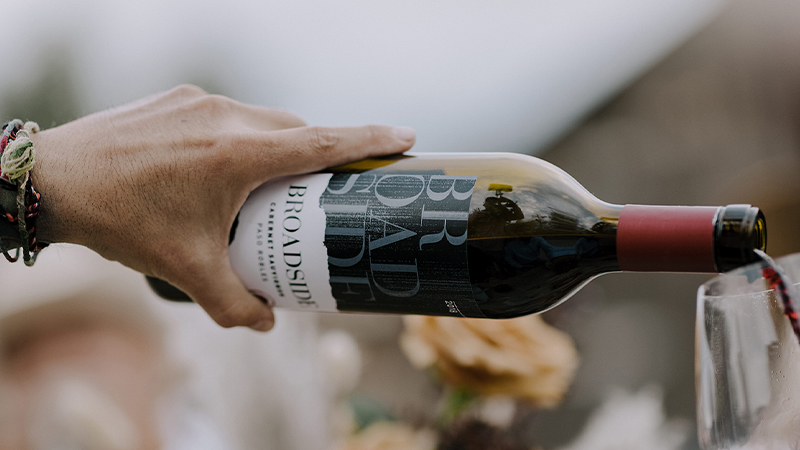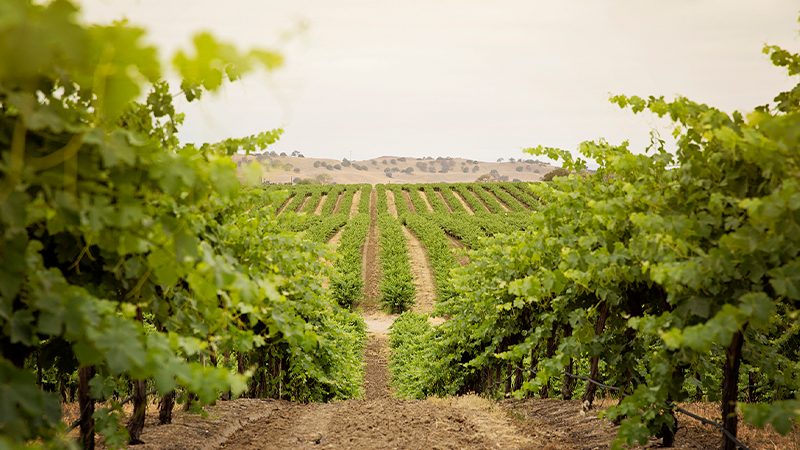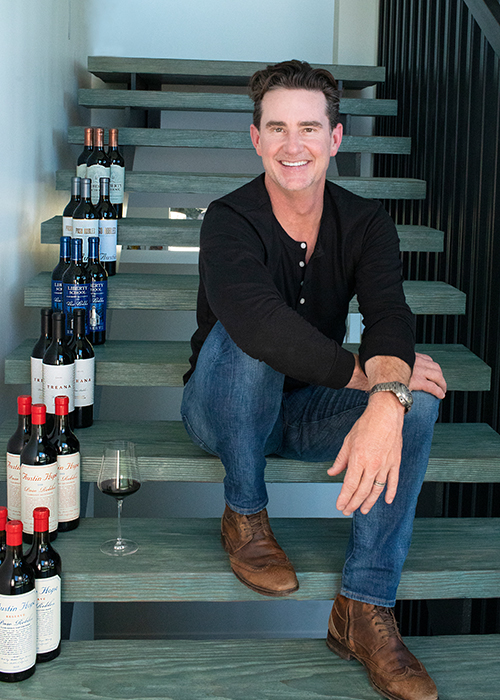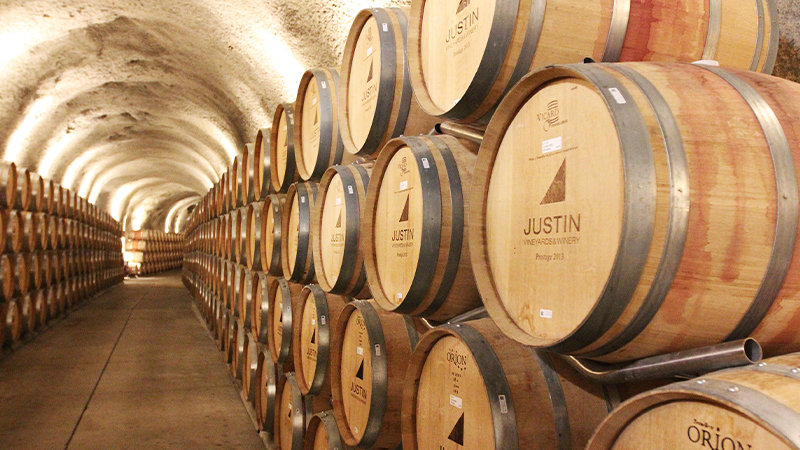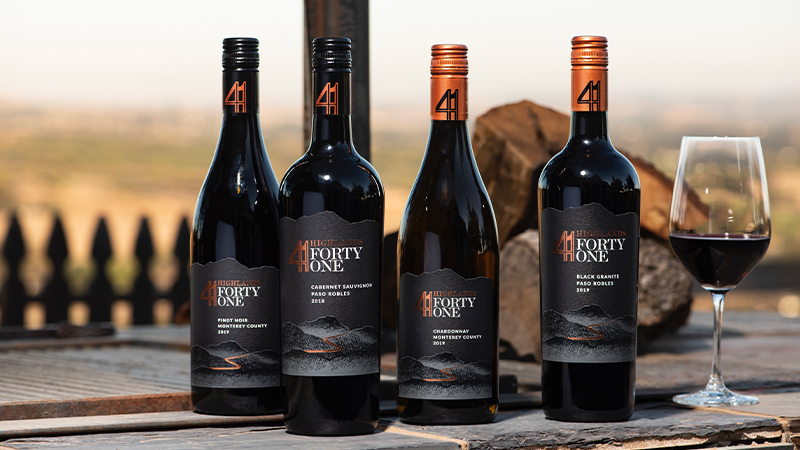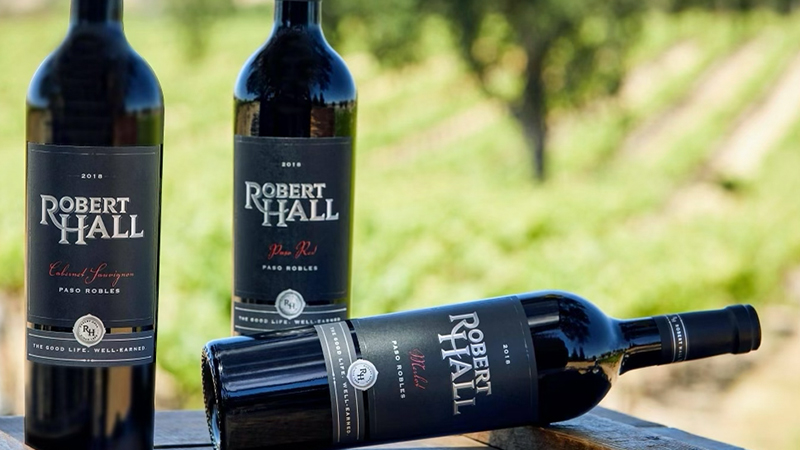
Tucked between Los Angeles and San Francisco on California’s rugged Central Coast, Paso Robles Wine Country is lovingly referred to as “the land of cowboys and wine” for its Wild West history and exceptional varietals. The area was co-founded by outlaws Frank and Jesse James’ uncle, Drury James, in the mid-19th century, and today it retains much of its fiercely independent spirit and entrepreneurial drive. The region is home to artisan winemakers who fuse Old World flavors with cutting edge techniques and highlight the importance of sustainability. Today, Paso Robles boasts over 200 wineries and 60 different varieties, many overlooking lush vineyards and breathtaking views.
A short distance from the Pacific Ocean, Paso Robles’ vines are matured by warm, dry days of steady sunshine and cooled in the evenings by fog and sea breezes, which together produce a microclimate unique to North America. The area’s pendulous diurnal swing, one of the most pronounced of any areas, shuttles between 50 at night and 100 in the day during growing seasons. “Although this makes it difficult to figure out what clothes you should wear throughout the day, it does allow for excellent concentration of flavor in the Cabernet, as well as balanced acidity,” says Adam LaZarre, the award-winning head vintner at Broadside winery, a Paso Robles Wine Country staple.
Here, deep and passionate reds reign supreme, and the area is internationally heralded as one of the best destinations for Rhônes, heritage-grape Zinfandels, and Cabernet Sauvignon, a highly prized varietal. Sumptuous, berry-tinged, and with a plush mid-palate, these bold reds frequently are often characterized by notes of licorice and peppercorn, capped with a textured minerality and vibrant mouthfeel.
Learn more about a few of the region’s wineries that have championed Bordeaux varieties and the wines that help define the dedication to Cabernet Sauvignon:
Broadside
Tapping into the spirit of the pioneers, Broadside’s portfolio is all about celebrating the area’s unique topography and terroir. The winery, founded in 2006, has a reputation for producing bottles with balanced tannins, elegant finish, and pure natural flavors. Sustainability is also crucial: Broadside sources fruit from predominantly SIP-certified vineyards (standing for Sustainability in Practice) and makes wine at a SIP-certified crush facility that is solar powered. An incredible value with superior quality, the brand’s portfolio was rated 90+ points from Vinous in 2020 — a point of pride for LaZarre. “It’s one thing to sell $300 bottles of wine to a few people,” he says. But he loves to “produce great wines that taste two to three times the price and to know that, on any given night, someone somewhere is enjoying my wine.” So, pick up a bottle of Broadside Cabernet Sauvignon for a sharp blend that’s not too tart and contains the perfect balance of blackberry and smoky oak.
Broken Earth Winery
This laid-back, California-cool winery has surprisingly glitzy and unconventional Hollywood roots. It was first established in 1973 by veteran actors Jack Webb, James Caan, Wayne Rogers, and Peter Falk, with the help of local visionary Herman Schwartz. Together, they launched 500 acres under the name Continental Vineyard, which at the time was the U.S.’s largest crop of Merlot, and was the first large-scale vineyard in the region. Today, Broken Earth Winery, previously Continental Vineyard, has over 11 different Cabernet Sauvignon “colonial selections” that honor the winery’s legacy of programs, from the CV Cabernet Reserve to the namesake Cabernet Sauvignon. However, we recommend selecting a bottle of 2018 Reserve Broken Earth Cabernet Franc — the winery’s most anticipated first crop of Cabernet Franc —which boasts balanced flavors of raspberry, tobacco, and pepper. We think it’s best served with a lamb chop, venison, or a dessert fruit tart. General manager and VP Justin Tooley notes: “At the very core of our roots, the Broken Earth brand represents legacy, sustainability, and excellence. These were the pillars of the founding growers of Continental Vineyards, and these continue to be the focus of the Forsythe family today.”
Hope Family Wines
Hope Family is one of the founding families of Paso Robles and a leading Cabernet Sauvignon producer in the area. They are the team behind several key Paso brands, including the Austin Hope label. Hope is committed to elevating the entire region of Paso Robles as a world-class wine region and has spent decades promoting the area. “I truly believe in the rising tide of Paso, and I couldn’t be more excited about where we are today,” said Hope. Try the 2018 Austin Hope Cabernet Sauvignon, the No. 7 Wine in Wine Enthusiast’s Top 100 Wines in the World 2020 list (if you can get your hands on a bottle!). It delivers a great example of the what Paso can do with Cabernet; it contains notes of black currants and stone fruit complemented by smokey spices, with a deep, bold, full-bodied flavor offset by a bright acidity and elegant tannins.
J. Lohr Vineyards & Wines
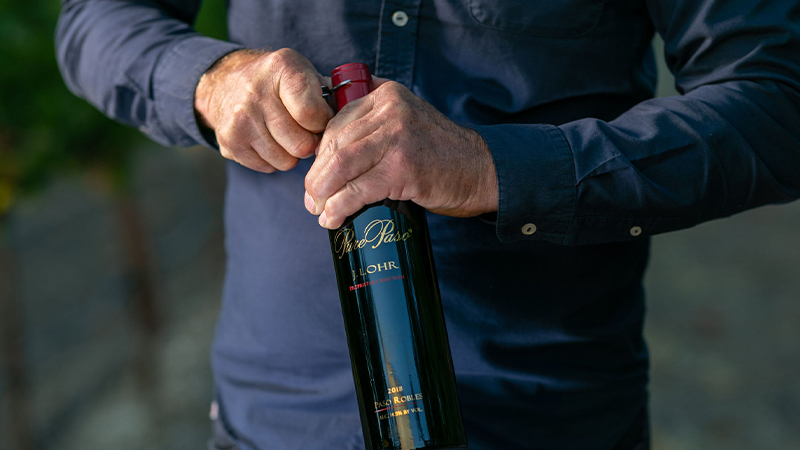
Founded by Jerry Lohr, a Paso Robles wine scene pioneer, this family-run vineyard has been called “one of California’s historic, best-known wineries;” its reputation for innovation and quality is well established. The winery is known for Bordeaux and Rhône varietals that express vibrant, concentrated flavors invoking Paso Robles’ adventurous past. Try the bold, structured (and limited) J. Lohr Signature Cabernet Sauvignon, with its notes of vanilla, clove, dark fruit, and smoky charcoal. Or, for a taste of Central Coast history, pour a glass of the J. Lohr Pure Paso™ Proprietary Red Wine, a marriage of Cabernet Sauvignon and Petite Sirah, two of the region’s most deeply loved grapes. J. Lohr director of winemaking Steve Peck has been with the winery for 15 vintages. “With vineyards throughout the Paso Robles appellation, we are able to zero in on specific properties and blocks where each variety performs at its absolute best,” he says. “The result is exciting quality and excellence each and every vintage.”
JUSTIN Vineyards & Winery
When founder Justin Baldwin first established JUSTIN on the West side of Paso Robles in 1981, he championed the area’s unique microclimate, as well as its superior growing ability for making world-class Bordeaux-inspired blends. Combining traditional techniques like small-barrel aging with proprietary technology like the “Air Knife” — invented by JUSTIN’s winemakers to “boost grape quality and efficiency” — the brand is known for its award-winning reds and red blends ideal for everyday dining as well as cellar aging. Sample ISOSCELES, the flagship blend, with its deep purple and blue-black cast, and aromas of spice, black currant and vanilla. Its mid-palate of ripe fruit, cedar and rich tannins provide a pleasant mouthfeel leading to a complex finish. “Throughout 40 years of operation our focus on quality and passion for making world-class wine drives our every action,” says Baldwin. “As an early, modern-day Paso wine pioneer I am humbled and gratified by the growth and respect earned of our appellation.”
Highlands 41 from the Riboli Family Winery
A tribute to the iconic highway and nearby breathtaking Creston Highlands, Highlands 41 embodies rugged independence, with each wine containing varietals crafted from 100 percent estate-owned vineyards. Skirting the northeastern portion of the Creston District AVA, Highlands 41’s wines benefit from a unique terroir seen only in France’s Burgundy, Australia’s Limestone Coast, and, of course, Paso Robles. Each bottle of red is an epic experience. “The Paso Cab wine style delivers big, bold flavors with rich, opulent texture that is balanced by bright acidity and approachable tannins,” says Anthony Riboli, Riboli Family’s fourth-generation winemaker. “There is a wonderful dark fruit character that the region has been able to push forward in Cabernet Sauvignon wines within the last 10 years. A distinct minerality showcases the unique calcareous soils of Paso Robles and is a defining factor in the character of these Cabernets.” Riboli Family Wines was recently named American Winery of the Year by Wine Enthusiast. In addition, the family built a state-of-the-art, 100 percent sustainably certified, energy efficient winery in Paso Robles that is powered by solar panels and recycles all water used. For the perfect evening pairing, Riboli recommends a bone-in ribeye steak with the Highlands 41 Cabernet Sauvignon.
Robert Hall Winery
Robert Hall Winery is the product of a pivotal trip to France’s Rhône Valley, which resulted in a commitment to bring a similar passion Robert Hall witnessed there for stateside winemaking. In his travels through California — noting that the coastal breezes that flow over the Santa Lucia Mountains provided ideal growing conditions — Hall set out to create a 173-acre estate with a diversity of soil and utilizing techniques that minimize environmental impact and carbon footprint. Under head winemaker Don Brady, the winery has earned global accolades as the recipient of the International Wine & Spirits “Wine of America” Award in 2006. In addition, the winery, now owned by O’Neill Vintners & Distillers, launched a company-wide sustainability initiative in 2018 to encourage greener practices among California’s vineyards through regenerative viticulture. Select a bottle of Robert Hall Winery Cabernet Sauvignon, with base notes of blackberry and cedar, echoed by aromas of chocolate and ripe fruit, with a finish of balanced, velvety tannins. Brady notes: “Our goal at Robert Hall is to craft high-quality wines that capture the essence of Paso Robles. We proudly source from all 11 AVAs in Paso, utilizing only the best of the best for our wines.”
And these are just a few of the many labels elevating the Cabernet Sauvignon game in the region. “Paso is a pretty awesome place for Cabernet Sauvignon for a few reasons,” says Adam LaZarre, noting that not only is the climate ideal for cultivating this grape, the growing season is also lengthy, extending from April to October, helping late-ripening varietals like Cabernet gradually and steadily mature. “In addition, Paso has exceptionally diverse soil. I mean it’s crazy, with over 30 different soil types throughout the region,” he says, noting a high concentration of calcareous soils that are especially beneficial to Cabernet due to their ability to retain water during the long, dry summer, while providing ideal drainage during the rainy season. “All these natural advantages help create wines that are distinct, expressive, and just yummy.”
This article is sponsored by the brands noted in this article and the Paso Robles Wine Country Alliance.
